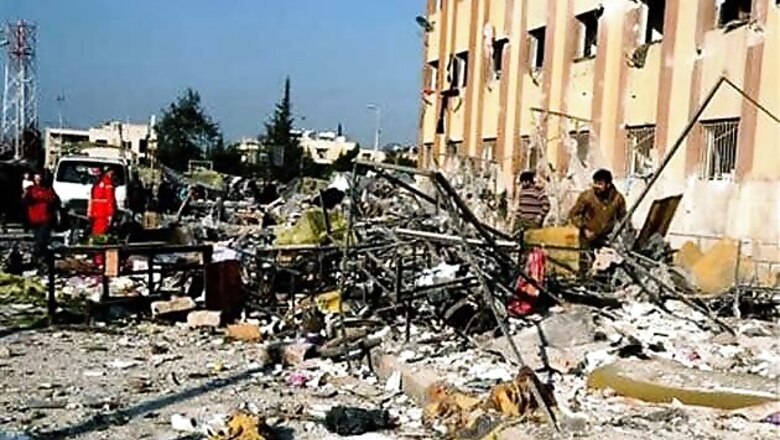
views
Kuwait: Denouncing "unrelenting horrors" in Syria's war, UN Secretary-General Ban Ki-moon appealed on Wednesday for an end to the violence and more aid to address a situation he said was catastrophic and worsening by the day.
"How many more people will be killed if the current situation continues?" Ban said, addressing a donors conference in Kuwait aimed at raising money for UN humanitarian work.
"I appeal to all sides and particularly the Syrian government to stop the killing ... in the name of humanity, stop the killing, stop the violence," the UN leader said.
Syrian opposition activists said at least 65 people were found shot dead with their hands bound in the embattled northern city of Aleppo on Tuesday, the latest reported massacre over the course of 22 months of conflict.
They blamed militiamen loyal to President Bashar al-Assad, while the government blamed the Islamist rebel Nusra Front. It was impossible to confirm who was responsible given Syria's restrictions on access for independent media.
More than 60,000 people have been killed in all, according to a UN estimate, since the conflict began as a peaceful movement for democratic reform and escalated into an armed rebellion after Assad tried to crush the unrest by force.
An official of the Gulf Cooperation Council, a grouping of six Gulf Arab states, said a total of $1 billion had been pledged at the meeting by midday, after promises of $300 million each from Saudi Arabia, Kuwait and the United Arab Emirates.
The United Nations warned on Monday that without more money it would not be able to help millions of Syrians and appealed for donations at the aid conference to meet its $1.5 billion target.
Four million Syrians inside the country need food, shelter and other aid and more than 700,000 more are estimated to have fled to countries nearby.
Scale of crisis escalates
King Abdullah of Jordan told the gathering that Syrians had taken refuge in his country in their hundreds of thousands but Amman's ability to help was at its limits. "We have reached the end of the line, we have exhausted our resources," he said.
UN humanitarian chief Valerie Amos said that Syrian agriculture was in crisis, hospitals and ambulances had been damaged and even painkillers were unavailable.
Harsh winter weather had made matters worse, and people lack winter clothes, blankets and fuel, with women and children particularly at risk, she said, adding:
"We are watching a human tragedy unfold before our eyes."
The conference was seeking pledges of $1 billion of aid for Syria's neighbours hosting refugees and another $500 million to fund humanitarian work for 4 million Syrians afflicted by the civil war inside the country.
The aid would fund operations for the first half of this year, but the United Nations has so far received pledges covering just 18 percent of the target, unveiled last month as the scale of Syria's humanitarian crisis escalated sharply.
Even if pledges are made, aid groups have found in the past that converting promises into hard cash can take time.
Nevertheless, there was early positive news for the gathering when the oil-rich states of Kuwait, Saudi Arabia and the UAE each pledged $300 million in aid.
Kuwait's emir, Sheikh Sabah al-Ahmad al-Sabah, told the meeting "horrifying reports" of violence had raised questions about Syria's future and aid efforts had to be redoubled.
Sexual violence, detentions
But Ban said much more remained to be done. "The situation in Syria is catastrophic and getting worse every day," he said.
"Every day Syrians face unrelenting horrors," he said, including sexual violence and detentions.
Iran, a close ally of Assad, said the blame for the humanitarian crisis lay with opposition fighters who had come to Syria from abroad.
Iranian Foreign Minister Ali Akbar Salehi said the government and its Syrian opponents should "sit and talk and form a transitional government".
"Those who are causing these calamities are mercenaries who have come to Syria from outside the country," he said.















Comments
0 comment